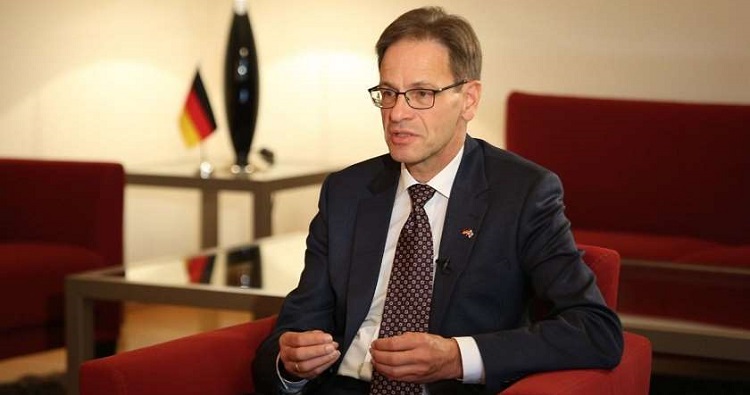German Ambassador: political parties must find “strength to cooperate”

Knirsch expressed his hope the parties would show “courage” and “strength” to carry out this kind of cooperation, pointing out that “If you want to be a pro-European party, you should take this into account”. Photo: Facebook/Deutsche Botschaft Tiflis
German Ambassador to Georgia Hubert Knirsch on Wednesday said the 12-point conditions established by the European Union for granting Georgia the membership candidate status later this year were a “big challenge” for the Georgian political spectrum and noted the domestic political parties must find the “strength to cooperate” with each other.
I understand that it is difficult for some parties. Some parties do not have a tradition of working with each other, it is difficult, but this is what the European Union hopes to see in Georgia”, the German diplomat told local media.
Knirsch expressed his hope the parties would show “courage” and “strength” to carry out this kind of cooperation, pointing out that “If you want to be a pro-European party, you should take this into account”.
Mamuka Mdinaradze, the Executive Secretary of the ruling Georgian Dream party, on Sunday said a part of the domestic opposition had “boycotted Europe” and the implementation of the EU conditions.
Mdinaradze said it was “in the interests” of the Government to ensure it was granted the EU candidate status, as it would “strengthen the positions” of the ruling team, while claiming the outcome was not in the interests of the opposition United National Movement party.
On July 1, the ruling party presented its strategy for fulfilling the EU conditions. The strategy involves a working group - featuring representatives of all Parliamentary parties and the civil sector - that will provide a “comprehensive assessment” of the implementation of the legislative body’s regulations in the field of Parliamentary supervision, and prepare a legislative initiative to correct identified shortcomings.
 Tweet
Tweet  Share
Share